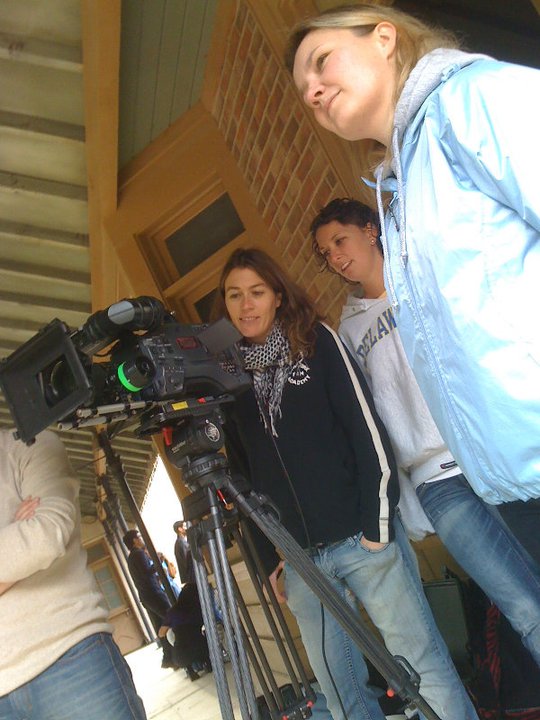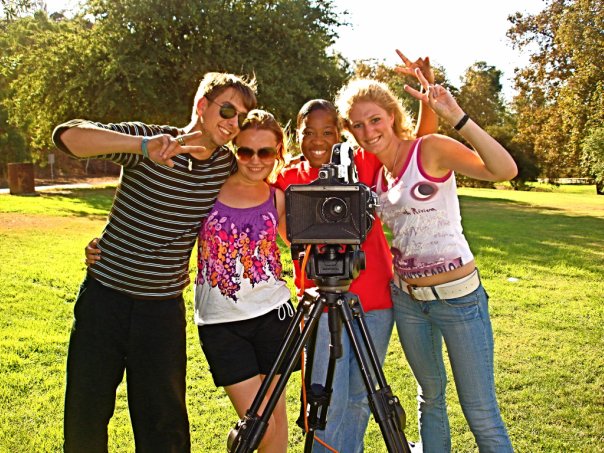Many young people who are dreaming of being able to enroll in a higher education institution in the United States often give up this idea because of high tuition costs. But for those who really want to achieve their goals, the financial barrier is not an issue.
Today we spoke with New York Film Academy College of Visual & Performing Arts (NYFA) graduate student, Elena Kulikova, whose story is truly fascinating and inspiring. In 2008, she was awarded a Fulbright scholarship that completely covered her two-year master’s degree tuition at NYFA’s Los Angeles campus, as well as living and traveling expenses.
 Elena, how did your Fulbright Scholarship come about?
Elena, how did your Fulbright Scholarship come about?
I really love studying, in general. I need constant development, constant stimulus, and training is the best motivator. Previously, I had received my degrees from Lomonosov Moscow State University and VGIK, and I then wanted to get my Masters Degree abroad.
At that time, I was working with a wonderful film producer Roman Borisevich. We attended various international festivals and film markets together and I realized that I want to study co-production — an area of filmmaking that wasn’t widely known, and taught in Russia at that time.
Visual Arts education in the United States was a natural logical solution, but I could not afford it financially, and began to look for grants options. As a result, I learned about the Fulbright program, which is on a competitive basis, providing grants for education, research, and training in any US university for citizens of Russia and many other countries.
Can you describe the competition process?
The first step required submitting translated diploma of higher education, two letters of recommendation, two motivational essay (personal statement, study objective), as well as to pass the pre-TOEFL test. Then I passed the TOEFL iBT and GRE General official exams. The final step was the interview.
Who conducts the interview and what questions should candidates be prepared for?
Every interview begins with a self-presentation. This part should be prepared in advance. Preparation will give you self-confidence, which is very important. The members of the Commission are teachers from different US universities participating in the Fulbright program. There might be representatives of Harvard, the University of Utah, professors from Texas, etc. But this does not mean that you go to those universities. Their goal is to assess your motivation to study in the chosen area, see if you have “sparkling eyes,” that your English is good and academic goals are serious.
You should keep in mind that Fulbright provides scholarship for more than 40 disciplines. And the commission chooses one or two candidates from each field. I can’t tell exactly how many applications were in my stream, but at the first stage, we were told that there are 10 candidates for one spot.
Be confident, positive, friendly and prepare a few questions to the Commission. Ask them for advice. Keep the dialogue.
Tell us about your interview experience?
This is a very funny story. A specific time of the interview was scheduled for each candidate. Of course I was very nervous, because it was the final step. When I entered into the room and saw six American teachers, my heart dropped down.
They asked me to introduce myself and talk about my education and work experience. I was prepared for this question and spoke enthusiastically about how lucky I was to study in two of the best Russian Universities, and how grateful I am to my destiny.
Suddenly, the professors started talking to each other, and then one of them interrupted me. He asked me to wait outside because of “technical issues.”
I did not understand anything, but went out obediently, thinking I had failed.
Ten minutes later, I was invited back and explained that there was confusion with my documents. Instead of my portfolio they had documents of another Elena Kulikova from Tula (also a member of the competition), who studied the biology of invertebrates.
The professors apologized and asked me to come for a new interview the next day. We laughed together, and next day I wasn’t scared anymore. The professors seemed almost like family.
How did you prepare for the TOEFL and GRE exams?
I did it on my own and most of my energy was spent for GRE preparation. This exam is more difficult. In addition to language skills it required a refresher in algebra and geometry memory. Even if it’s just a high school level, it’s been 10 years since I graduated the school. After all, my GRE result was “passing,” but with the TOEFL I “flunked” the speaking section.
I did not have enough time to formulate my thoughts. The timer counted five seconds, and I fell into a stupor. Due to the low results in this section my overall score went down. Instead of the required 100 I scored 97.
I would advise students who are planning to apply to try several times before the exam to pass the training tests (from books or online) and watch video tutorials on the passage of each section (a lot of them are on YouTube), to avoid the situation that happened to me.
Any tips for recommendation letters and motivation essays? What should you pay attention to?
Letters of recommendation have to be written by teachers (who know the academic performance of the candidate), or colleagues, including managers from work. They should really know you and your abilities very well.
Motivation letter: Try to imagine your future in three years. What would you like to achieve? Now think about how a Masters Degree from a United States university can help you realize your goals. This should be the main idea of your essay. Describe your experience up to date. What achievements have you already made? At the end, add about how you plan to apply the knowledge when you return to Russia.

Please share with us the most vivid memories of studying producing at NYFA.
At the New York Film Academy I started adding practical skills and techniques to the theory background I had and I was able to produce more than 10 projects in two years.
Most of them were short films for students from the Filmmaking Department, but still it was a major operation, which required my producer’s knowledge to count the number of shooting days and break down a budget on paper. We received official permission to shoot along with major production companies in Film LA, scouted locations, organized and conducted auditions, signed contracts with actors and crew, and organized catering. In short, with each new project I was gaining new real producing experience.
In particular, I would like to mention the Head Producer of the program – Lydia Cedrone. She is an incredibly strong woman and an excellent professional. She knows how to motivate and is always ready to work with each student who needs her advice or consultation. We have developed wonderful friendships.
Also, my favorite NYFA instructor became Brian Udovich, who led the NYFA Industry “Pitching” course. Being an extremely shy person by nature, I was shaking like a leaf. He coached us how to speak in front of an audience. But the adrenaline from his lessons, plus the practical tips and friendly atmosphere, made me free from the fear of public speaking. Now I am happy and completely free to participate in the pitches and give presentations and provide lectures.
Also, I’ve never thought that, as a producer, I can independently write a full-length screenplay. NYFA proved to me that it is possible! During training, I wrote two features and a pilot for a television series in English. My thanks goes to Sharon Hoffman for her patience, professional comments, edits, as well as the delicious brownies that she fed the exhausted students who were not sleeping night after night writing the next 20 pages of their script.
What were some of your achievements while studying in the US?
It is difficult to write about the achievements. Rather, I have received a huge number of possibilities: the ability to learn from real professionals working in Los Angeles; the ability to have trained in the production company of Mark Cuban (“Good Night, and Good Luck,” “Road,” “Jacket”); the ability to live in the heart of the film industry and attend guest speakers events with Steven Spielberg, Janusz Kaminski, Christopher Nolan, Darren Aronofsky, David Fincher, and J.J. Abrams; attend screening previews of films and join meetings with writers and directors nominated for an Oscar. Additionally, I worked as a volunteer at the AFI Festival.
How do you motivate yourself?
I just believe in my dreams. In fact, if you really want something, everything in life is possible.
What helps you make the right decision in difficult situations?
Confidence in my beliefs, colleagues support, and experience.
Where do you see yourself in ten years?
I prefer not to build plans for a career. I prefer harmony in my personal and professional life. Only then do I feel happy and full of energy for the realization of the boldest creative ideas. If something starts to outweigh—work or family—the problems begin. The only thing I’m sure about the future: I will keep studying and I would like to get a PhD.
In your opinion how in today’s world does the success of a creative person depend on the level of education received?
In my opinion creative success does not directly depend on the education received. And success itself is generally an ephemeral substance. Like luck. But education makes life more interesting and opens up new horizons, awakens imagination, and gives emotions and experiences that are not available to uneducated people.
